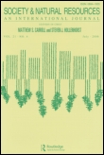
SOCIETY & NATURAL RESOURCES
Scope & Guideline
Unveiling the Complex Interplay Between Society and Nature
Introduction
Aims and Scopes
- Social-Ecological Systems:
Research in this area examines the interdependencies between human and ecological systems, focusing on how social dynamics influence environmental outcomes and vice versa. - Environmental Governance and Policy:
The journal explores frameworks and practices of governance in natural resource management, analyzing the roles of various stakeholders, including communities, governments, and NGOs. - Community Engagement and Participation:
Studies focus on how community involvement shapes resource management and conservation efforts, emphasizing participatory approaches and local knowledge. - Environmental Justice:
This scope investigates the equitable distribution of environmental benefits and burdens, addressing issues of race, class, and power in environmental decision-making. - Cultural and Socioeconomic Factors:
Research highlights how cultural beliefs, values, and socioeconomic conditions affect environmental attitudes and behaviors, contributing to the understanding of sustainable practices. - Conflict and Collaboration in Resource Management:
The journal addresses conflicts arising from competing interests in natural resource use and explores collaborative approaches to resolve these tensions.
Trending and Emerging
- Indigenous Rights and Knowledge:
There is an increasing emphasis on the role of Indigenous peoples in natural resource management, highlighting the importance of traditional ecological knowledge and rights in conservation efforts. - Climate Change Adaptation and Resilience:
Research focusing on adaptation strategies and resilience-building in the face of climate change is gaining traction, reflecting urgent global challenges and the need for actionable solutions. - Social Media and Environmental Activism:
The intersection of social media and environmental movements is emerging as a critical area of study, examining how digital platforms facilitate activism and community engagement in environmental issues. - Health and Environment Nexus:
Emerging themes explore the connections between public health and environmental conditions, particularly in the context of pollution, resource management, and community well-being. - Urban-Rural Dynamics in Resource Management:
The journal is increasingly addressing the complexities of urban-rural interactions in resource governance, reflecting the importance of these dynamics in contemporary environmental challenges.
Declining or Waning
- Traditional Conservation Approaches:
There is a noticeable decrease in papers focused solely on conventional conservation strategies, as the field increasingly emphasizes integrated and participatory approaches that involve local communities. - Resource Extraction without Community Consideration:
Research on resource extraction practices that do not consider community impacts is becoming less prevalent, reflecting a growing awareness of social justice and community rights in resource management. - Single-Dimensional Environmental Policies:
The focus on singular environmental policies that do not account for socio-economic and cultural dimensions is declining, as interdisciplinary approaches gain prominence. - Top-Down Governance Models:
Papers centered on authoritarian or top-down governance models are waning, with a shift toward exploring collaborative governance and inclusive decision-making processes.
Similar Journals

Euro-Mediterranean Journal for Environmental Integration
Exploring Innovative Approaches to Environmental IntegrationThe Euro-Mediterranean Journal for Environmental Integration, published by SPRINGER HEIDELBERG, serves as a pivotal platform for interdisciplinary research in the realm of environmental science, particularly focused on the unique ecological and socio-economic context of the Euro-Mediterranean region. With its ISSN 2365-6433 and E-ISSN 2365-7448, this journal aims to foster a collaborative approach to environmental challenges, integrating insights from various fields such as ecology, geography, and sustainable development. Since its inception in 2016, it has made significant strides, achieving a Q3 ranking in Environmental Science and maintaining a notable position within the Scopus rankings, sitting at #102 out of 233 in the general environmental science category, which reflects its growing influence in academic discourse. The journal is committed to open dialogue among researchers, professionals, and students aimed at advancing knowledge and promoting innovative solutions to pressing environmental issues. Access to its comprehensive articles and findings will be key to contributing to a more sustainable future.
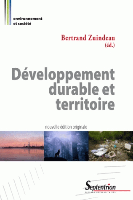
Developpement Durable & Territoires
Connecting Research and Practice in Sustainable DevelopmentDéveloppement Durable & Territoires is a premier open-access journal dedicated to fostering innovative research and discourse in the fields of sustainable development and territorial studies. Published by the RESEAU DEVELOPPEMENT DURABLE & TERRITOIRES FRAGILES, this journal serves as a vital platform for researchers, practitioners, and policymakers seeking to address the complex challenges posed by environmental sustainability and territorial management. Since its inception in 2002, it has committed to disseminating high-quality research that informs best practices and encourages interdisciplinary collaboration across various sectors. While it currently lacks a quantified impact factor and HIndex, its accessibility ensures a wide reach and engagement with contemporary thought leadership in sustainability. The journal is based in Villeneuve d'Ascq, France, and provides an essential resource for advancing knowledge in sustainable practices and insights into fragile territories.

Geosaberes
Championing High-Quality Discourse in the Geographical CommunityGeosaberes is a pivotal open-access journal published by the Geography Postgraduate Program at the Federal University of Ceará, dedicated to advancing the field of geography through the dissemination of high-quality research and critical discourse. Since its inception in 2010, this journal has actively supported the global academic community by providing accessible research findings and theoretical insights that contribute to the understanding of geographical phenomena. With a strong focus on interdisciplinary studies and local contexts, Geosaberes invites contributions from both emerging and established scholars, fostering dialogue and collaboration among researchers, professionals, and students worldwide. The journal strives to publish articles that reflect innovative ideas, enhance academic understanding, and promote sustainable practices in geography, thereby solidifying its role as an influential platform within the field.
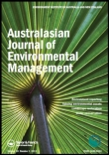
Australasian Journal of Environmental Management
Connecting researchers to drive impactful environmental change.The Australasian Journal of Environmental Management is a highly regarded publication in the field of environmental studies, published by Taylor & Francis Ltd. With an ISSN of 1448-6563 and an E-ISSN of 2159-5356, this journal serves as a pivotal platform for disseminating innovative research and insights pertaining to the management of environmental resources across Australia and broader geographical contexts. The journal has achieved impressive rankings, including a Q2 classification in Geography, Planning and Development and a Q3 in Management, Monitoring, Policy and Law for 2023, highlighting its relevance and impact within the academic community. Researchers and professionals are encouraged to contribute to its mission of advancing knowledge and practices in sustainable environmental management. With a publication history spanning from 1996 to 2024, the journal remains committed to fostering interdisciplinary collaboration and critical discourse on environmental challenges. While access options may vary, the significance of this journal as a resource for students and practitioners alike cannot be overstated, as it shapes contemporary perspectives on environmental policy and management.
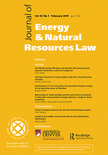
Journal of Energy & Natural Resources Law
Charting Legal Innovations in Energy and Natural ResourcesJournal of Energy & Natural Resources Law, published by Taylor & Francis Ltd, stands as a pivotal source for the examination and discussion of legal issues related to energy and natural resources. With an ISSN of 0264-6811 and an E-ISSN of 2376-4538, this esteemed journal has garnered attention in both the legal and energy sectors, boasting notable rankings with a Q3 category in Energy (Miscellaneous) and a Q1 in Law for 2023. The journal serves as a critical platform for researchers, professionals, and students, offering peer-reviewed articles that delve into contemporary legal frameworks, regulatory evolutions, and policy developments affecting natural resources and energy industries. Additionally, its impressive Scopus rankings, placing it in the 91st percentile for Social Sciences - Law and the 50th percentile for Energy, underline its commitment to high-quality research and its contribution to the discourse surrounding sustainable energy practices and legal innovations. The journal aims to foster dialogue and collaboration among experts in these dynamic fields, making it an essential resource for those engaged in energy law and natural resource management.

Resources-Basel
Championing open access for global environmental dialogue.Resources-Basel is a premier open access journal published by MDPI, specializing in the fields of environmental science, management, and landscape conservation. Since its inception in 2012, the journal has established itself as a reputable source of scholarly research and discourse, achieving notable rankings including Q2 in Management, Monitoring, Policy and Law and Q1 in Nature and Landscape Conservation as of 2023. With impressive Scopus rankings, including a 27th place in the category of Environmental Science focused on Nature and Landscape Conservation, and a 82nd in Management, Monitoring, Policy and Law, Resources-Basel plays a crucial role in advancing knowledge and best practices within these vital domains. Based in Basel, Switzerland, the journal embraces the open access model, ensuring that research is widely accessible to scholars, practitioners, and the public alike, catering to the pressing issues of sustainable resource management and environmental conservation. Researchers, professionals, and students are encouraged to engage with the latest findings published here, contributing to the global discourse on sustainable practices and policy innovation.
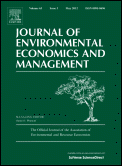
JOURNAL OF ENVIRONMENTAL ECONOMICS AND MANAGEMENT
Transforming Environmental Challenges into Economic Opportunities.JOURNAL OF ENVIRONMENTAL ECONOMICS AND MANAGEMENT, published by Academic Press Inc Elsevier Science, stands as a leading platform for scholarly discourse at the intersection of environmental economics and management. Established in 1974 and continuing through 2024, the journal targets key issues in environmental policy, management strategies, and economic implications of environmental challenges, catering to an extensive audience of researchers, professionals, and students. It boasts a prestigious Q1 ranking in both Economics and Econometrics and Management, Monitoring, Policy and Law for 2023, underscoring its significant contribution to the field. Additionally, with outstanding Scopus rankings—placed in the 88th percentile for Economics and Econometrics and the 82nd percentile for Environmental Science—the journal is recognized for its rigorous peer-reviewed research. Although it follows a subscription model, the insights gained from its comprehensive articles are invaluable for addressing today’s pressing environmental and economic challenges.
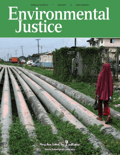
Environmental Justice
Innovating solutions for a just and sustainable future.Environmental Justice is a leading interdisciplinary journal published by MARY ANN LIEBERT, INC that provides a vital platform for the exploration of environmental issues through the lens of social equity and justice. With a strong focus on the intersection of geography, health, and policy, this journal spans topics from spatial inequality to public health implications related to environmental risks. Since its inception in 2008, the journal has gained recognition, achieving a Q1 ranking in Geography, Planning, and Development and a Q2 ranking in both Health, Toxicology, and Mutagenesis as well as Management, Monitoring, Policy, and Law. The journal is an essential resource for researchers, policymakers, and practitioners alike, reflecting the increasing importance of environmental justice in addressing global challenges. Although it does not operate under an open-access model, the comprehensive insights published in Environmental Justice are instrumental for advancing scholarly discourse and practical applications in the field.
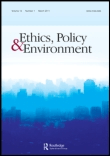
Ethics Policy & Environment
Transforming Environmental Challenges through Ethical InsightsEthics Policy & Environment is a prominent interdisciplinary journal published by Routledge Journals, Taylor & Francis Ltd, focusing on the complex interplay between ethical considerations, policy-making, and environmental issues. With an ISSN of 2155-0085 and an E-ISSN of 2155-0093, this journal serves as a critical platform for researchers, professionals, and students engaged in the fields of geography, policy, and philosophy. Highlighting the latest research and theoretical advances, it occupies a strong position within academic discourse, evidenced by its Q2 status in Geography, Planning and Development and Q1 in Philosophy for 2023. The journal has established itself as a key resource for understanding the ethical dimensions of environmental policy, making it essential for stakeholders navigating the challenges of sustainable development. With its coverage from 2011 to 2024, it is a timely source of knowledge that invites contributions that advance the conversation on ethics and the environment.
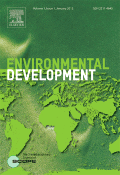
Environmental Development
Innovating interdisciplinary approaches to environmental challenges.Environmental Development is a premier academic journal published by Elsevier, dedicated to advancing the field of environmental science through interdisciplinary research and innovative practices. With a focus on geography, planning, and development, as well as management, monitoring, policy, and law, this journal provides a rigorous platform for scholars and practitioners to share insights that shape sustainable environmental policy and practice. Holding a prestigious Q1 ranking in both relevant categories and boasting impressive Scopus rankings - 62 out of 821 in Geography and 60 out of 399 in Environmental Science - Environmental Development stands out as a critical resource for those invested in the future of our planet. The journal emphasizes impactful research that addresses contemporary challenges, fostering dialogue across disciplines and geographical boundaries. With a commitment to high-quality research, it offers an important outlet for those aiming to influence environmental policy and developmental strategies globally. Join the growing community of researchers, professionals, and students engaged in promoting sustainable environmental practices through the knowledge shared in this esteemed publication.